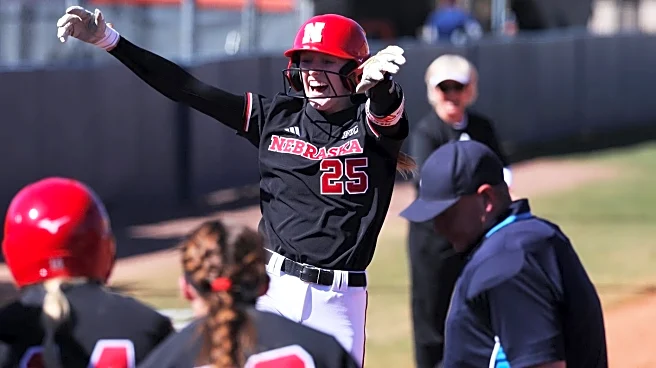What's Happening?
Arsenal showcased a dynamic attacking style in their recent match against Olympiacos, driven by Martin Odegaard's aggressive play. Odegaard, returning to the starting lineup, played a pivotal role in Arsenal's 2-0 victory, contributing significantly to the team's offensive strategy. His ability to deliver game-changing passes and his willingness to take risks with possession were highlighted as key factors in Arsenal's approach. Mikel Arteta, Arsenal's manager, emphasized the importance of speed in their attack, aiming to bypass the opponent's press and create opportunities before the defense could settle. Arsenal's direct speed in advancing the ball was notably higher than the league average, reflecting Arteta's strategy to exploit the pace and timing of their front three.
Why It's Important?
The shift in Arsenal's attacking strategy under Mikel Arteta signifies a potential transformation in their gameplay, focusing on speed and aggression. This approach could enhance Arsenal's competitiveness in the Premier League and Champions League, leveraging Odegaard's creativity and the team's overall attacking prowess. The emphasis on quick transitions and exploiting spaces could make Arsenal a formidable opponent, challenging traditional defensive setups. This strategy not only highlights Odegaard's role but also underscores Arteta's tactical evolution, aiming to maximize the team's strengths and adapt to modern football dynamics.
What's Next?
Arsenal's continued focus on aggressive attacking play may lead to further tactical adjustments, with Arteta likely to refine this strategy as the season progresses. The team's ability to maintain this high-paced approach will be crucial in upcoming matches, particularly against top-tier opponents. Arteta's emphasis on squad depth and player rotation could also play a significant role in sustaining this strategy, ensuring that key players like Odegaard remain fit and effective throughout the season.
Beyond the Headlines
The aggressive attacking strategy adopted by Arsenal could influence broader tactical trends in football, encouraging other teams to explore similar approaches. This shift may also impact player development, with a focus on enhancing speed and decision-making skills. Additionally, Odegaard's role as a creative leader could inspire younger players, highlighting the importance of adaptability and risk-taking in modern football.











